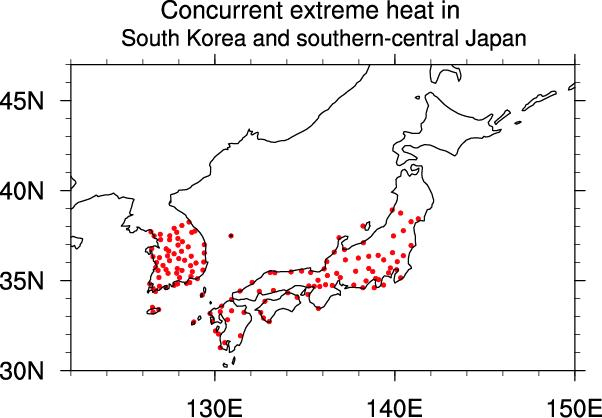
Studies showed that South Korea and Japan's southern-central region are frequently affected by the insane increase in temperature. Climatologists examined the large-scale air circulation leading to the concurrent extreme heat over these regions to find out what causes such extreme temperature.
The first author of this recently published research paper, Ke Xu, who is postdoc working with Prof Riyu Lu and Prof. Jiangyu Mao in the Institute of Atmospheric Physics, Chinese Academy of Sciences, said that a deep anomalous anticyclone over East Asia is responsible for this increased heat that includes "anomalous subsidence and consequent higher surface temperature."
As per Xu, the anomalous anticyclone triggers by the wave trains, originating from the upstream regions. The findings showed that these wave trains can be categorized into two types, which are "indicative to the occurrence of EH over South Korea and southern-central Japan."
The researchers also found that the distinction between these two types of wave train is modulated by the Asian westerly jet, which can determine "the horizontal structure of the Rossby wave in terms of spatial scale and geographical distribution."
Researchers believe that this study, published in the Journal of Climate, points outthe unique characteristics of the circulation which is responsible for extreme heat in South Korea and southern-central Japan.

Climate change is a fact
Despite the denials by many that climate change is just a hoax, it is a fact that earth's atmosphere has changed drastically over the years, the UN Secretary-General Antonio Guterres has called it the "defining issue of our time."
As reported, Guterres will travel to several Pacific islands where climate change has caused a rise in sea level and became a threat to many small countries. Last week while talking to the press he said that in Fiji, Tuvalu and Vanuatu he met with families which were affected by cyclones, flooding and other extreme weather events.
After US president Donald Trump decided to pull out of the Paris agreement to combat global warming, which he believes is a myth, UN director for the International Crisis Group, Richard Gowan said, "The Trump administration's disdain for climate diplomacy has left China looking like the main guarantor of the Paris agreement."
A climate action summit, which is considered the last opportunity to prevent irreversible climate change, will take place at the United Nations in September this year.
It should be noted that in the UK, a professor at the University of Cambridge has pitched in for an exclusive research centre to find out new ways to repair the atmosphere as the humans have no time to tackle climate change.









